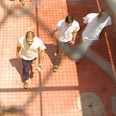
Prison Force Sees Danger Daily
Little-known 'Force 100' tasked with preventing hostage-taking at one of country's most dangerous prisons
MEGIDDO - Soldiers at Megiddo Prison simulate a routine prisoner count gone awry, as a detainee overwhelms the unit’s sergeant. The soldiers deploy immediately, confine all prisoners to their beds and extract the sergeant in less than 20 seconds.
The whole operation occurred so quickly in fact, that the photographer documenting the drill asked that it be repeated so he would have enough time to do his job.
The drill, held last year, demonstrated the results of the hard training done by Force 100, the little-known army unit tasked with preventing hostage taking at the prison, one of Israel’s most dangerous.
Last year, the unit helped quell a little-reported riot at the prison in the wake of the killing of Hamas leader Abdul Aziz Rantisi in April. In fact, its members say they face such dangerous situations daily.
“Combat soldiers might not encounter any terrorists during their three-year service, while we go into the heart of the danger every day,” says one soldier in the secretive unit.
Force 100 was established in 1992 at Megiddo Prison, a military facility near Jenin that houses about 1,200 security prisoners. The unit is tasked with sensitive missions such as the prisoner count, and is trained to offer a rapid response in extreme situations.
Just like at other prisons, the main concern there is a prisoner uprising culminating in wardens being taken hostage.
“It’s a skilled, operational intervention force,” says Military Police Lt. Col. Meir Ohana.
Highly motivated
The unit has received little attention over the years. However, some of its members found themselves in the limelight while escorting the terrorists released under the prisoner exchange deal with Hizbullah last year.
The troops must endure a demanding training regime before they are admitted into the unit. Volunteers go through an initial screening, followed by a selection process lasting several days.
Those who meet the standards start with full-fledged basic training, followed by grueling months of additional training, including counter-terrorism techniques, advanced shooting practice, and hand-to-hand combat.
Training sessions are often held in conjunction with elite IDF units, including Flotilla 13 (Israel’s naval commandos), and the counter-terrorism Duvdevan unit.
Ohana says motivation to join the unit is high, but almost 50 percent of the candidates drop out during the course of the rigorous training period.
However, those who make it face the genuine challenge only once they begin their service at the jail.
“The prison is a volcano that can erupt at any moment,” says a colonel involved with the unit whose name cannot be revealed due to secrecy considerations.
He says the IDF recently killed a detainee’s brother and it is impossible to predict the reaction.
An officer there says forces must be prepared for an outbreak of violence at any given moment, because most detainees there are young and militant.
Dangers of the prisoner count
An unarmed officer and a sergeant perform the daily prisoner count while Force 100 members, the only ones allowed to carry weapons near the prisoners, watch over them.
Before the count begins, one of the prisoners instructs all detainees to sit on their beds with their backs to the entrance.
The armed troops, equipped with protective vests, helmets, and drawn weapons, then search the prisoners’ tents to ensure that everything is in order, before allowing the count to proceed.
The force’s commander, a lieutenant who cannot be named for security reasons, says speed is critical when operating at the prison.
“We need to rescue the hostages and get out of there before more prisoners arrive. It requires absolute professionalism and perfect coordination,” he says.
In Israel, an only child who wishes to join a combat unit must obtain parental consent. Ironically, many Force 100 soldiers are only children whose parents objected to them performing combat service.
“When my mother heard where I ended up and who I come in contact with on a daily basis, she begged to sign the combat service permit” she had previously refused to sign, one soldier says.











